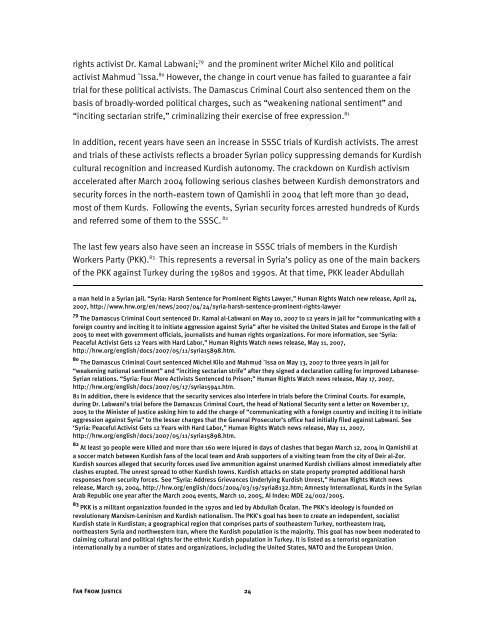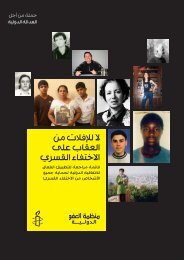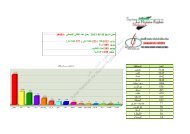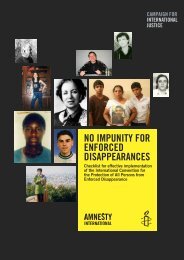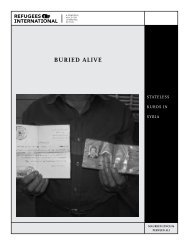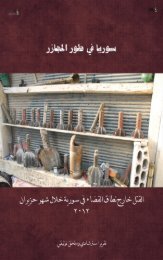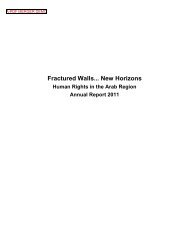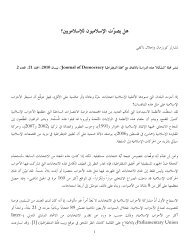Far From Justice - Human Rights Watch
Far From Justice - Human Rights Watch
Far From Justice - Human Rights Watch
- No tags were found...
Create successful ePaper yourself
Turn your PDF publications into a flip-book with our unique Google optimized e-Paper software.
ights activist Dr. Kamal Labwani; 79 and the prominent writer Michel Kilo and politicalactivist Mahmud `Issa. 80 However, the change in court venue has failed to guarantee a fairtrial for these political activists. The Damascus Criminal Court also sentenced them on thebasis of broadly-worded political charges, such as “weakening national sentiment” and“inciting sectarian strife,” criminalizing their exercise of free expression. 81In addition, recent years have seen an increase in SSSC trials of Kurdish activists. The arrestand trials of these activists reflects a broader Syrian policy suppressing demands for Kurdishcultural recognition and increased Kurdish autonomy. The crackdown on Kurdish activismaccelerated after March 2004 following serious clashes between Kurdish demonstrators andsecurity forces in the north-eastern town of Qamishli in 2004 that left more than 30 dead,most of them Kurds. Following the events, Syrian security forces arrested hundreds of Kurdsand referred some of them to the SSSC. 82The last few years also have seen an increase in SSSC trials of members in the KurdishWorkers Party (PKK). 83 This represents a reversal in Syria’s policy as one of the main backersof the PKK against Turkey during the 1980s and 1990s. At that time, PKK leader Abdullaha man held in a Syrian jail. “Syria: Harsh Sentence for Prominent <strong>Rights</strong> Lawyer,” <strong>Human</strong> <strong>Rights</strong> <strong>Watch</strong> new release, April 24,2007, http://www.hrw.org/en/news/2007/04/24/syria-harsh-sentence-prominent-rights-lawyer79 The Damascus Criminal Court sentenced Dr. Kamal al-Labwani on May 10, 2007 to 12 years in jail for “communicating with aforeign country and inciting it to initiate aggression against Syria” after he visited the United States and Europe in the fall of2005 to meet with government officials, journalists and human rights organizations. For more information, see ‘Syria:Peaceful Activist Gets 12 Years with Hard Labor,” <strong>Human</strong> <strong>Rights</strong> <strong>Watch</strong> news release, May 11, 2007,http://hrw.org/english/docs/2007/05/11/syria15898.htm.80 The Damascus Criminal Court sentenced Michel Kilo and Mahmud `Issa on May 13, 2007 to three years in jail for“weakening national sentiment” and “inciting sectarian strife” after they signed a declaration calling for improved Lebanese-Syrian relations. “Syria: Four More Activists Sentenced to Prison;” <strong>Human</strong> <strong>Rights</strong> <strong>Watch</strong> news release, May 17, 2007,http://hrw.org/english/docs/2007/05/17/syria15941.htm.81 In addition, there is evidence that the security services also interfere in trials before the Criminal Courts. For example,during Dr. Labwani’s trial before the Damascus Criminal Court, the head of National Security sent a letter on November 17,2005 to the Minister of <strong>Justice</strong> asking him to add the charge of “communicating with a foreign country and inciting it to initiateaggression against Syria” to the lesser charges that the General Prosecutor’s office had initially filed against Labwani. See‘Syria: Peaceful Activist Gets 12 Years with Hard Labor,” <strong>Human</strong> <strong>Rights</strong> <strong>Watch</strong> news release, May 11, 2007,http://hrw.org/english/docs/2007/05/11/syria15898.htm.82 At least 30 people were killed and more than 160 were injured in days of clashes that began March 12, 2004 in Qamishli ata soccer match between Kurdish fans of the local team and Arab supporters of a visiting team from the city of Deir al-Zor.Kurdish sources alleged that security forces used live ammunition against unarmed Kurdish civilians almost immediately afterclashes erupted. The unrest spread to other Kurdish towns. Kurdish attacks on state property prompted additional harshresponses from security forces. See “Syria: Address Grievances Underlying Kurdish Unrest,” <strong>Human</strong> <strong>Rights</strong> <strong>Watch</strong> newsrelease, March 19, 2004, http://hrw.org/english/docs/2004/03/19/syria8132.htm; Amnesty International, Kurds in the SyrianArab Republic one year after the March 2004 events, March 10, 2005, AI Index: MDE 24/002/2005.83 PKK is a militant organization founded in the 1970s and led by Abdullah Öcalan. The PKK's ideology is founded onrevolutionary Marxism-Leninism and Kurdish nationalism. The PKK's goal has been to create an independent, socialistKurdish state in Kurdistan; a geographical region that comprises parts of southeastern Turkey, northeastern Iraq,northeastern Syria and northwestern Iran, where the Kurdish population is the majority. This goal has now been moderated toclaiming cultural and political rights for the ethnic Kurdish population in Turkey. It is listed as a terrorist organizationinternationally by a number of states and organizations, including the United States, NATO and the European Union.<strong>Far</strong> <strong>From</strong> <strong>Justice</strong> 24


